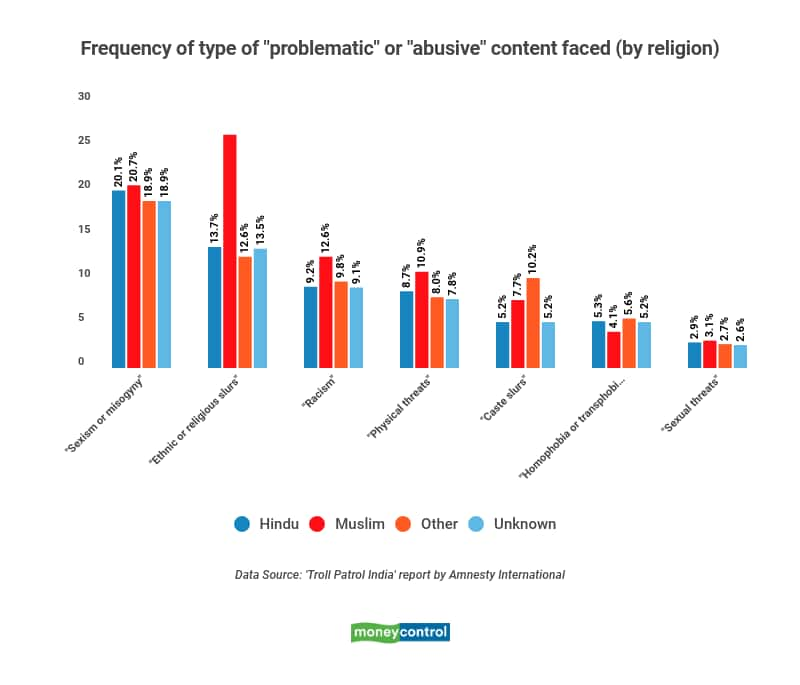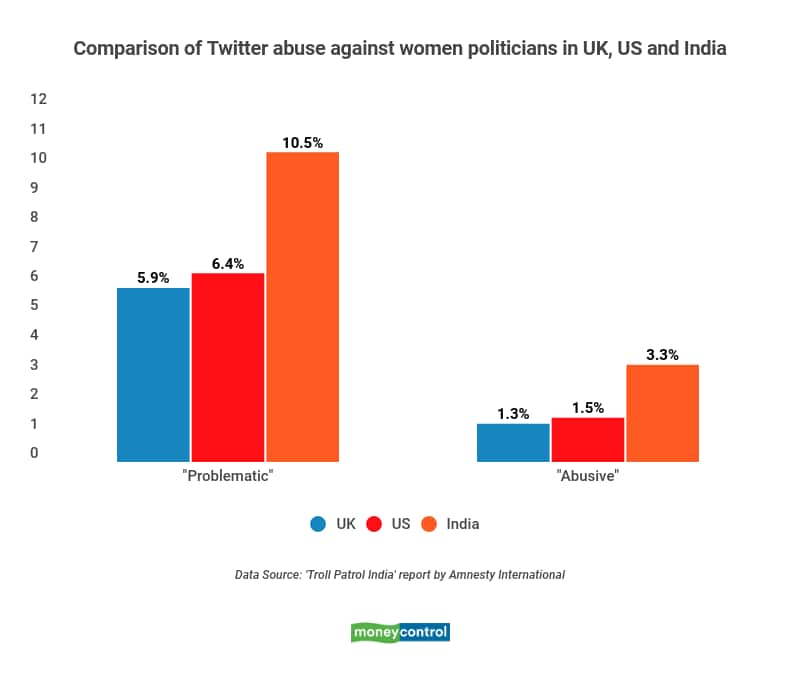



Around one million “problematic” or “abusive” tweets targeting 95 women politicians in India were posted between March and May 2019 — the period of the Lok Sabha election — according to a study by Amnesty International India.
This translates to around 113 such tweets per woman politician per day during in the said period.
Around 13.8 percent of the tweets that mentioned these women politicians, or 1 in every 7 tweets, was either “problematic” or “abusive”, Amnesty International India has said.
Of all such tweets classified as “problematic” or “abusive”, the study found one-fifth to be containing sexism or misogyny.
The research, titled ‘Troll Patrol India: Exposing Online Abuse Faced by Women Politicians in India’, also suggests that women politicians who were more prominent on Twitter, were targeted more.
The top 10 surveyed women politicians who received majority of mentions on Twitter (74.1 percent) also received most of such mentions (79.9 percent). Moneycontrol could not independently verify the report.
Those from marginalised communities received more abuse
The human rights group has said that those from marginalised communities were disproportionately targeted. The report points out that Muslim women politicians received more ethnic or religious slurs than women from other religions.
Women politicians “perceived as Muslims” received significantly more abuse as compared to those from other religions. They received 55.5 percent more “problematic or abusive” content.
Of this, 26.4 percent content contained ethnic/religious slurs, nearly double the proportion for women who are or “perceived as Hindus” (13.7 percent).

Similarly, women politicians from Scheduled Caste (SC), Scheduled Tribe (ST) and Other Backwards Classes (OBC) communities received 59 percent more caste-based abuse, as compared to women from general castes.
Indian women politicians face more abuse on Twitter
The report suggests that women politicians in India received significantly more online abuse than their counterparts in the United Kingdom and US.
About 7.1 percent tweets mentioning politicians were 'problematic' or 'abusive' in UK or UK. Using a similar methodology used in US and UK, but for a shorter period during elections, found that women politicians in India experienced 13.8 percent such tweets.

Those from ‘other parties’ received more such content
Women politicians across party lines experienced sexist abuse on Twitter during the said period, the degree varied depending on which party they belonged to.
The survey claims to have found that women politicians associated with ‘other parties’ experienced 56.7 percent more problematic or abusive content on Twitter than those from the ruling Bharatiya Janata Party (BJP).
Those associated with the Indian National Congress received 45.3 percent more such content than those from BJP.
Amnesty International India said that report was compiled with the help of 1,912 decoders from 82 countries and 26 states in India. Around 1.1 lakh tweets mentioning 95 women politicians in India over the three-month period of the 2019 general elections were analysed.
Responding to the Amnesty International India report, a Twitter spokesperson told Moneycontrol: “Abuse, harassment and hateful conduct have no place on Twitter and we have taken strong steps to proactively address the health of the conversation on our service - including around peak moments such as Lok Sabha 2019. Today more than 50 percent of abusive content that we take action on is identified proactively using technology, instead of relying on reports from people using Twitter. Our work will never be done, and our product, policy and engineering teams continue to work at scale and pace to build a healthier Twitter.”
Discover the latest Business News, Sensex, and Nifty updates. Obtain Personal Finance insights, tax queries, and expert opinions on Moneycontrol or download the Moneycontrol App to stay updated!
Find the best of Al News in one place, specially curated for you every weekend.
Stay on top of the latest tech trends and biggest startup news.